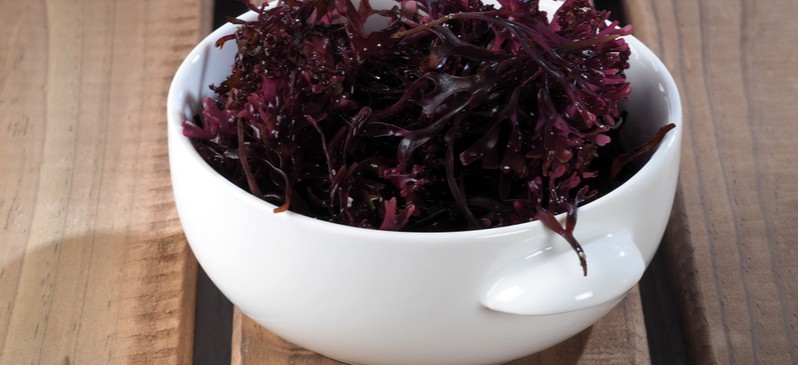Sea Moss
You may have heard about the sea moss “superfood” recently. Celebrities are touting it as an immune-boosting, skin healing, digestive aid.
But, like most declared superfoods, sea moss has been consumed for centuries.
Although the research on sea mass is limited, there are reports of the seaweed possessing brain-protecting, immune-boosting, and digestion-aiding properties.
Plus, we know that seaweed is an excellent source of health-promoting nutrients.
So is sea moss all it’s cracked up to be?
What Is Sea Moss?
Sea moss, also known as Irish moss, is a red seaweed with the scientific name Chondrus crispus. It’s been consumed by humans for thousands of years, found mainly on rocks along the North Atlantic Coast.
Today, it’s planted and processed in several coastal countries, including the U.S., China, and Ireland, and used for its carrageenan content.
Carrageenan is commonly used as a food additive for its binding, thickening, and stabilizing effects. It’s used in food products, including almond milk, coconut milk, hemp milk, creamers, yogurt, canned soups, and frozen pizzas.
Carrageenan is also an active ingredient in some conventional medicine solutions.
Sea moss is also valued for its algal polysaccharide, extracted from carrageenan, and has medicinal and health-related properties. Studies propose that algal polysaccharide aids:
- immunity enhancement
- antioxidant effects
- antibacterial and anti-inflammatory activities
- tumor inhibition
- hypertension prevention
- high cholesterol prevention
- blood sugar control
In addition to its carrageenan and algal polysaccharide content, sea moss is also vibrant in:
- proteins
- peptides
- amino acids
- lipids
- pigments
The potential health benefits of this red algae are linked to its neuroprotective and immune-boosting constituents.
Benefits
There are some potential benefits of sea moss, but the studies evaluating these effects are done in labs or animals.
There is no clear understanding of how Irish moss may improve humans’ health, but the seaweed nutrient content is promising.
- Aids Digestion
Irish moss acts as a prebiotic, allowing it to influence the composition of our gut microbiota.
It’s also a mucilaginous food with a sticky texture and helps the stool move through the gastrointestinal tract more easily.
In a BMC Complementary and Alternative Medicine study, rats fed Irish moss exhibited substantial gut microbiota composition improvements.
Studies suggest that, based on these findings, sea moss may improve gut health and immune modulation.
It was able to increase the population of beneficial bacteria and decrease harmful bacteria, including Streptococcus pneumonia.
- May Boost Neurological Health
Studies suggest that red seaweed may have neuroprotective effects because of its ability to alleviate oxidative stress.
For this reason, researchers indicate that C. Crispus may be a promising ingredient in pharmaceutical applications for potential novel anti-neurodegenerative drugs for humans.
- Improve Immune Function
A study published in Applied and Environmental Microbiology indicates that red seaweed enhances host immunity and suppresses the expression of “virulence factors” or molecules caused by bacteria, fungi, and viruses.
This research study was conducted in a laboratory. However, researchers came to the conclusion that its results suggest that components of C. Crispus can play a health-promoting role in animals and humans.
- Increases Satiety
When combined with liquids, Irish moss has a gel-like texture, which is thick and sticky. It acts as a soluble fiber that helps to keep you full longer.
Adding Irish moss to meals may increase satiety and, therefore, possibly cut down on the number of calories you consume.
There isn’t scientific evidence to back this up, but the idea is that sea moss works similarly to chia seeds and aloe in this respect.
- May Have Anti-Tumor Effects
Some lab studies suggest that Irish moss has anti-tumor effects due to its algal polysaccharide content.
Researchers don’t have definitive answers about why this occurs in lab trials. Still, they indicate that it may be due to polysaccharide’s ability to enhance the body’s immunity and improve its antioxidant activity.
- Rich in Iodine
A study published in the Journal of Medicinal Food found that iodine in C. Crispus is high and bioavailable.
Both low and high iodine intake levels can increase the risk of disease, so it’s essential to consume the right amount.
Iodine-rich foods support thyroid function, healthy metabolism, and brain health.
For instance, your thyroid must have high enough iodine levels to make thyroxine, a critical hormone that works to regulate important, everyday biochemical reactions.
Thyroid disorders that may arise from low-iodine levels can lead to symptoms like sluggish appetite, heart issues, mood changes, weight fluctuations, and appetite changes.
- May Boost Skin Health
Sea moss is usually found in skincare products due to its anti-microbial and anti-inflammatory properties. It’s also abundant in nutrients like omega-3 fatty acids, vitamin A and also magnesium.
Using sea moss topically can help to hydrate and soothe your skin while fighting damage and infections.
There isn’t any scientific research on the benefits of Irish moss for the skin, but its vitamin and mineral content alone is promising for promoting healthy aging.
How to Use
You can find sea moss in raw, dried, or gel form. It’s also available as a powder or capsule, and it’s used as an ingredient in some skincare products.
You may have difficulty finding sea moss at your local grocery store, so purchasing it from a reputable company online is another option.
Irish moss is pretty much flavorless, so it can easily be added to smoothie, juice, and soup recipes. Remember that it will work as a thickener, so it also works well in sauces and even baked goods.
Like algae, you have the option to supplement with sea moss pills and sea moss powder.
But keep in mind that the science on humans is lacking, so check with your healthcare provider first. This is especially true if you have hypothyroidism.
Risks and Side Effects
When consumed in reasonable amounts, sea moss is generally safe and may have health benefits. Excessive consumption of Irish moss, however, can mean that you’re ingesting too much iodine.
Too much iodine can cause thyroid disorders, so you need to be careful not to take in too much of the nutrients.
If you have Hashimotos, thyroiditis, or other issues related to hypothyroidism, speak to your doctor about limiting iodine foods.
Final Thoughts
- Sea moss, or Irish moss, is a red seaweed that was initially harvested from rocks along the North Atlantic Coast.
- For thousands of years, sea moss has been used to boost immune function and aid digestion. Today, it’s cultivated in many countries for its potential health benefits.
- There aren’t many studies involving Irish moss on humans, but lab and animal studies suggest that it may help increase brain function, help digestion, promote thyroid health, and support immune function.








